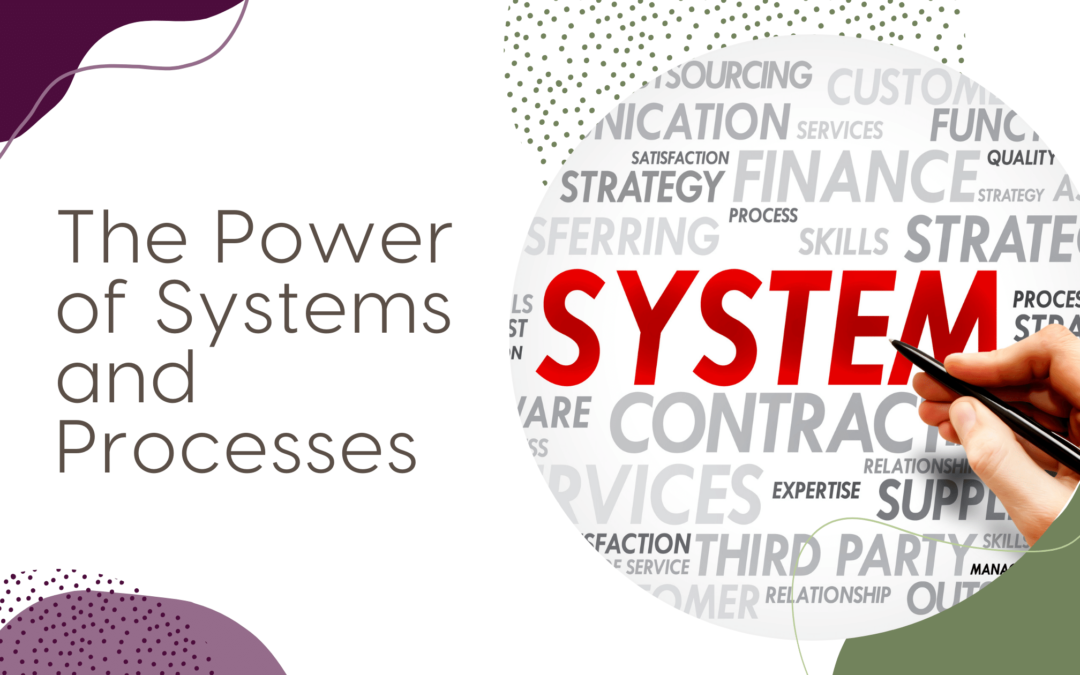
by Kimberly Laverdure | Apr 28, 2024 | Business Strategies, Expert Business Advice
The power of systems and processes comes into play when running and owning a business. efficiency is key.
Yet, many entrepreneurs find themselves bogged down by manual tasks, inefficient workflows, and ad-hoc processes that hinder productivity and growth. That’s where the power of systems and processes comes into play.
By implementing streamlined systems and processes, businesses can enhance efficiency, minimize errors, and maximize profitability. In this article, we’ll delve into the importance of systems and processes in business and how they can revolutionize your operations.
Systems and processes form the backbone of any successful business. They provide structure, consistency, and clarity, enabling teams to work cohesively towards common goals. Without well-defined systems and processes in place, businesses risk chaos, confusion, and inefficiency. By establishing clear workflows, automating repetitive tasks, and standardizing procedures, businesses can optimize their operations and achieve greater success.
Key Components of Effective Systems and Processes
Creating effective systems and processes requires careful planning, documentation, and implementation. Here are some key components to consider:
1. Workflow Analysis
Start by analyzing your current workflows and identifying areas for improvement. Look for bottlenecks, redundancies, and inefficiencies that can be addressed through automation or optimization.
2. Standard Operating Procedures (SOPs)
Document standard operating procedures for key business processes, such as sales, marketing, finance, and customer service. SOPs provide step-by-step instructions for completing tasks consistently and accurately.
3. Automation Tools
Leverage technology to automate repetitive tasks and streamline workflows. Invest in tools and software solutions that can automate data entry, scheduling, invoicing, and other manual processes.
4. Training and Education
Ensure that your team members are adequately trained on the systems and processes relevant to their roles. Provide ongoing training and education to keep them up-to-date on best practices and new developments.
5. Continuous Improvement
Regularly review and refine your systems and processes to adapt to changing business needs and market conditions. Solicit feedback from team members and stakeholders to identify areas for improvement and innovation.
Benefits of Streamlined Systems and Processes
Implementing streamlined systems and processes can yield a wide range of benefits for businesses, including:
Increased Efficiency: Streamlined processes reduce the time and effort required to complete tasks, leading to improved productivity and efficiency.
Reduced Errors and Rework: Clear workflows and standardized procedures minimize the risk of errors and rework, resulting in higher-quality outputs and satisfied customers
Enhanced Scalability: Scalable systems and processes allow businesses to handle increased workloads and expand operations without sacrificing quality or performance.
Improved Decision-Making: Access to accurate, timely data enables informed decision-making and strategic planning, driving business growth and competitiveness.
Greater Employee Satisfaction: Streamlined processes reduce frustration and stress for employees, leading to higher levels of job satisfaction and retention.
Having an business means efficiency is essential for success. By using the power of systems and processes, businesses can optimize their operations, minimize waste, and achieve greater profitability. From workflow analysis and SOP documentation to automation tools and continuous improvement initiatives, there are numerous strategies for streamlining business processes. By investing in streamlined systems and processes, businesses can position themselves for long-term success and sustainable growth in the ever-evolving marketplace.

by Kimberly Laverdure | Apr 27, 2024 | Business Strategies, Expert Business Advice
In this article, we’ll explore five proven strategies to help you streamline your business operations and achieve greater success.
Running a business involves juggling numerous tasks, from managing finances to overseeing projects and handling customer inquiries. With so much on your plate, it’s easy to feel overwhelmed and bogged down by the day-to-day operations. However, by implementing strategic measures to streamline your business processes, you can save time, reduce stress, and improve overall efficiency.
One of the biggest hurdles in managing business operations is the sheer volume of tasks that need to be completed. As your business grows, so does the complexity of managing its various aspects. Without effective systems and processes in place, you may find yourself drowning in a sea of emails, spreadsheets, and to-do lists, struggling to keep up with deadlines and deliverables.
Moreover, inefficient processes can lead to wasted time, resources and lost revenue, hindering your ability to focus on what truly matters: driving growth and achieving your business goals. Whether it’s redundant workflows, manual data entry, or communication bottlenecks, these inefficiencies can eat into your productivity and profitability if left unchecked.
Fortunately, there are steps you can take to streamline your business operations and reclaim control over your time and resources. By identifying areas for improvement and implementing targeted solutions, you can optimize your workflows, reduce overhead costs, and free up valuable resources to invest in strategic initiatives.
Now, let’s explore five key strategies that can help you streamline your business operations and pave the way for greater efficiency and success.
1. Automate Repetitive Tasks
One of the most effective ways to streamline your business operations is by automating repetitive tasks.
Whether it’s sending out email newsletters, processing invoices, or scheduling social media posts, there are numerous tools and software available that can automate these tasks, freeing up your time to focus on more important aspects of your business. (I’ll go into more details in another blog coming up!)
By harnessing the power of automation, you can increase productivity, minimize errors, and ensure consistency across your operations.
2. Delegate Effectively
As a business owner, it’s essential to recognize that you can’t do everything yourself. Delegating tasks to competent team members not only lightens your workload but also empowers your employees and fosters a culture of trust and collaboration within your organization.
When delegating, be sure to clearly communicate expectations, provide necessary resources and support, and offer feedback and guidance as needed. By delegating effectively, you can leverage the skills and expertise of your team to achieve better results and drive business growth.
3. Implement Project Management Tools
Managing projects efficiently is crucial for ensuring that tasks are completed on time and within budget. Project management tools, such as Asana, can help you organize tasks, track progress, and collaborate with team members effectively.
By centralizing project-related information and communication, these tools streamline workflow, improve transparency, and enable better decision-making. Whether you’re managing a small project or overseeing a large-scale initiative, implementing project management tools can significantly enhance your business operations.
4. Streamline Communication Channels
Effective communication is key to successful business operations, but it’s essential to streamline communication channels to avoid inefficiencies and miscommunications.
Instead of relying on scattered emails, tasks or asks getting lost in email threads, consider using unified communication platforms, such as Slack, to centralize communication and collaboration among team members.
By consolidating communication channels, you can reduce email clutter, facilitate real-time communication, and improve team collaboration, leading to smoother business operations and enhanced productivity.
5. Continuously Evaluate and Improve Processes
Lastly, to ensure ongoing efficiency and effectiveness in your business operations, it’s essential to continuously evaluate and improve your processes.
Regularly review your workflows, identify bottlenecks or inefficiencies, and seek feedback from employees and customers to identify areas for improvement.
By embracing a culture of continuous improvement, you can adapt to changing market dynamics, optimize your operations, and stay ahead of the competition.
Streamlining your business operations is essential for maximizing productivity, minimizing waste, and achieving long-term success. By implementing the strategies outlined in this article – automating repetitive tasks, delegating effectively, using project management tools, streamlining communication channels, and continuously evaluating and improving processes – you can streamline your operations, boost efficiency, and position your business for growth.
Remember, small changes can yield significant results, so don’t hesitate to take action and streamline your business operations today.
Stuck on how to do this? Schedule an Alchemy Session with me!

by Kimberly Laverdure | Apr 14, 2024 | Expert Business Advice, Inner Wisdom, Intuition
How does leveraging intuition for business success actually work or even look like?
In business, success often hinges on making informed decisions quickly and effectively. While data-driven analysis and strategic planning are essential tools for entrepreneurs, there’s another valuable resource that often goes overlooked: intuition. In this 3rd blog of my 3 part Intuition Series, we’ll explore the power of intuition in business and how harnessing this innate ability can lead to greater success and fulfillment.
If you haven’t read Part 1: Demystifying Intuition or Part 2: Embracing Intution, click the titles to read more about this series.
The Role of Intuition in Business
Intuition, often referred to as a “gut feeling” or “inner knowing,” is a subconscious process that allows us to make decisions based on instinct and insight rather than logic alone. In the business, intuition plays a vital role in various aspects, from identifying new opportunities and foreseeing potential challenges to navigating complex situations and building authentic connections with clients and colleagues. Learning how to take a subconscious process and marry it with conscious awareness is key.
Trusting Your Inner Wisdom
One of the keys to leveraging intuition for business success is learning to trust your inner wisdom.
This means tuning into your instincts, paying attention to subtle cues and signals, and allowing yourself to act on intuitive insights even when they may not be immediately logical or rational.
By cultivating a sense of trust in your intuition, you can tap into a powerful source of guidance and direction that can help you make better decisions and achieve your goals more effectively.
Making Intuitive Decisions
Intuitive decision-making involves combining rational analysis with intuitive insights to arrive at the best possible outcome. This often means listening to your gut feelings, following your instincts, and being open to unconventional ideas and solutions. To me, this is the true meaning of thinking outside the box.
Whether it’s choosing a new business direction, hiring the right team members, or negotiating a deal, trusting your intuition can lead to more innovative and successful outcomes.
Examples of Intuitive Success
Countless successful entrepreneurs and business leaders attribute their achievements in part to their ability to trust their intuition.
From Steve Jobs, who famously relied on his intuition to guide product design decisions at Apple, to Oprah Winfrey, whose intuitive instincts have shaped her media empire, there are numerous examples of individuals who have leveraged intuition for business success.
Practical Tips for Leveraging Intuition
Here are some practical tips for you if you’re looking to leverage intuition in their business endeavors (and you should!):
- Practice Mindfulness: Cultivate mindfulness practices such as meditation and self-reflection to quiet the mind and enhance your intuition. This allows you to feel into your body. It doesn’t mean you eliminate thoughts but rather learning to focus on the first ones that happen in relation to seeking answers.
- Listen to Your Body: Pay attention to physical sensations such as tension, relaxation, a humming feeling, tingling, or “butterflies” in the stomach, as these can be indicators of intuitive insights.
- Keep a Journal: Write down your intuitive hunches, dreams, and inspirations to track patterns and gain deeper insights into your intuitive process. Don’t discount anything. The key is the learn how to listen or acknowledge the first thoughts, pictures, feelings or other hunches right away. The smallest or what might seem insignificant can be the biggest insights at times.
- Seek Feedback: Discuss your intuitive insights with trusted friends, mentors, colleagues, or advisors to gain perspective and validation.
- Take Action: Trust your intuition and take action on your insights, even if they seem unconventional or risky. Remember, intuition often leads to unexpected opportunities and breakthroughs.
In a business world that values logic, data, analysis and facts, it’s easy to overlook the power of intuition in business. However, by learning to trust your inner wisdom and leveraging intuition and intuitiveinsights, you can gain a competitive edge, make better decisions, and achieve greater success and fulfillment in your entrepreneurial journey. So, embrace your intuition, listen to your gut, and let it guide you towards your goals.

by Kimberly Laverdure | Apr 13, 2024 | Expert Business Advice, Inner Wisdom, Intuition
Let’s take our talk about intuition in business to the next phase of embracing intuition.
As I wrote in yesterday’s blog of Demystifying Intuition, it’s often associated with mysticism or the realm of psychics and fortune tellers.
However, what if I told you that intuition is not as elusive as it seems?
In fact, it’s a natural and commonplace phenomenon that we all possess, whether we realize it or not. In this 2nd blog of a 3 part series, we’ll explore the concept of intuition and how it manifests in everyday life, from the financial expert who trusts their gut on a stock pick to the business owner who receives a sudden flash of insight for their next big idea.
The Financial Expert’s Gut Feeling
Imagine a seasoned financial expert scanning through reams of data and market trends, searching for the next lucrative investment opportunity.
Despite all the analysis and calculations, it’s often a gut feeling—a subtle yet unmistakable intuition—that guides their final decision. Perhaps they feel a sudden sense of certainty about a particular stock or investment, prompting them to take action and seize the opportunity before it’s too late.
While it may seem like a gamble to some, for the intuitive investor, it’s a calculated risk based on years of experience and finely tuned instincts.
The Business Owner’s “Eureka” Moment
Similarly, in the world of entrepreneurship, intuition plays a pivotal role in shaping business decisions and strategies. Picture a business owner grappling with the challenge of identifying their next breakthrough product or marketing idea.
Suddenly, like a bolt of lightning, inspiration strikes—a vivid image or concept that feels like a gift from the universe. This intuitive download is not the result of rational analysis or logical deduction but rather a deep, intuitive knowing that transcends conscious thought.
It’s as if the universe itself is whispering secrets directly into the entrepreneur’s ear, guiding them towards their next big success.
Everyday Intuitive Insights
But intuition is not limited to high-stakes investments or entrepreneurial endeavors.
In fact, it’s a constant presence in our daily lives, offering subtle nudges and whispers of guidance in moments both big and small.
Whether it’s a sudden feeling of unease that prompts us to change our route home, a gut instinct that warns us against a questionable business deal, or a fleeting intuition that leads us to connect with a long-lost friend, intuition is always there, quietly steering us towards our highest good.
Embracing Our Intuitive Wisdom
So why is it that we often dismiss or ignore our intuitive insights, chalking them up to mere coincidence or irrationality?
Perhaps it’s because we’ve been conditioned to prioritize logic and reason over intuition, relegating this innate wisdom to the realm of superstition or fantasy.
However, by embracing intuition and our intuitive natures, and learning to trust the wisdom that lies within us, we can unlock a world of limitless possibilities and potential.
Intuition is not some mystical gift bestowed upon a select few—it’s a natural and inherent aspect of the human experience. Whether we realize it or not, intuition is constantly whispering to us, offering guidance and insight in every moment of our lives. From the financial expert who trusts their gut on a stock pick to the business owner who receives a sudden flash of inspiration for their next big idea, intuition is always there, quietly nudging us towards our highest good.
So let’s learn how embracing intuition leads to trusting in the innate guidance and wisdom that lies within us and unlocking the limitless potential of the human spirit and knowledge.

by Kimberly Laverdure | Apr 12, 2024 | Expert Business Advice, Inner Wisdom, Intuition
Today, let’s talk about demystifying intuition in business. I know it’s a novel idea but I and my clients can tell you first hand how intuition plays a big role in our messaging, marketing, business decisions and so much more.
It’s time to learn to embrace inner wisdom in running and growing a business.
Intuition.
A word often shrouded in mystery and skepticism. Yet, what if I told you that intuition is not reserved for a select few, but is an innate gift that each and every one of us possesses? In this blog, we’ll explore the concept of intuition, the stigma surrounding it, and how demystifying intuition and embracing our inner wisdom can revolutionize the way we approach business and professional life.
Dispelling the Stigma
For far too long, intuition has been dismissed as whimsical or irrational, relegated to the realm of mysticism and the occult.
As a result, many people shy away from acknowledging or embracing their intuitive abilities, fearing judgment or ridicule from others.
However, the truth is that intuition is a natural and integral part of the human experience, deeply rooted in our subconscious mind and guiding us towards our highest good.
Harnessing Inner Wisdom in Business
In the logical and analytical world of business, logic and reason often reign supreme, leaving little room for intuition and gut feelings. Yet, time and time again, successful entrepreneurs and business leaders credit their intuitive insights for guiding them towards innovative solutions, lucrative opportunities, and business success.
Whether it’s a sudden hunch that leads to a game-changing decision or a subtle knowing that steers them away from a risky venture, intuition is a powerful ally in the business world.
Marriage of Magic and Professionalism
As someone who operates at the intersection of magic, inner wisdom, and business, I’ve witnessed firsthand the transformative power of embracing and demystifying intuition in professional settings. By marrying the seemingly mystical realms of intuition and magic with the practicality and professionalism of business, I’ve been able to offer my clients a unique and holistic approach to operations management and business strategy. Whether it’s tapping into intuitive insights to streamline processes, enhance team collaboration, or develop innovative marketing strategies, intuition has become an invaluable tool in my arsenal.
Embracing Intuition in Business
It’s time to shatter the stigma surrounding intuition and embrace our innate inner wisdom in the world of business. Instead of dismissing intuitive nudges as fanciful or irrational, let’s learn to recognize them for what they truly are: valuable insights that can guide us towards greater success and fulfillment. By integrating intuition into our decision-making processes, we can unlock new levels of creativity, innovation, and prosperity in our professional lives.
Intuition is not a mystical gift reserved for a select few—it’s a natural and inherent aspect of the human experience. By embracing our inner wisdom and trusting in the guidance of intuition, we can revolutionize the way we approach business and professional life. Instead of fearing judgment or skepticism, celebrate the power of intuition as a valuable ally in our journey towards success and fulfillment. Together, let’s dispel the stigma surrounding intuition and harness its transformative potential to create a brighter and more prosperous future in business and beyond.
I look forward to bringing you more topics and blogs on how well this actually works when you bring it into your life and business and listen to your inner knowing.

















